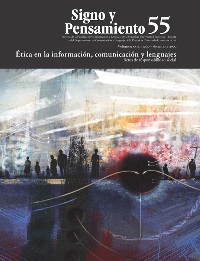Ethics in Intercultural Communication The case of translation
##plugins.themes.bootstrap3.article.details##
This paper aims at discussing how it is possible to devise a translation ethics that allows for the analysis and description of the problem of translation fidelity within a theoretical framework that surpasses the traditional antinomy between free and literal translation. First, a historical review is made of fidelity as a locus communis present in some classical authors in translation studies. Then the two major trends in modern translation theory (linguistic and cultural/ literary) are described. In the linguistic approach the concept of equivalence is discussed as a correlation of translation fidelity and in the cultural approach several socio-cultural theories are reviewed.
Translation ethics, Translation as intercultural communication, Translation fidelity, Translation equivalence, Dynamic Translation Model (DTM)Ética da tradução, Tradução como comunicação intercultural, Fidelidade da tradução, Equivalência de tradução, Modelo de Tradução Dinâmico (MTD)Ética de la traducción, Traducción como comunicación intercultural, Fidelidad traductora, Equivalencia traductora, Modelo Traductológico Dinámico (MTD)
— (2008a), “Towards an Integrated Translation Approach. A Dynamic Translation Model (DTM)” [en línea], disponible en http://www.sub.uni-hamburg.de/opus/ volltexte/2008/3726, recuperado: 2 de mayo de 2008.
— (2008b), “Deconstructionist and Poststructuralist Translation Approaches: Overview and Critique”, en Forma y Función, núm. 21, Departamento de Lingüística, Universidad Nacional de Colombia, pp. 325-344.
Chesterman, A. (1997), Memes of Translation, Amsterdam/Philadelphia, John Benjamins Publishing Company.
Cicerón. M. T. (46 a. de C.), De optimo genere oratorum [en línea], disponible en: http://www. thelatinlibrary.com/cicero/optgen.shtml, recuperado: 4 de abril de 2008.
Dolet, E. (1540), La maniere de bien traduire d’une langue en aultre [en línea], disponible en: http:// www.gutenberg.org/files/19483/19483-8.txt, recuperado: 7 de marzo de 2008.
Fabricius-Hansen, C. y Ostbo, J. (eds.) (2000), Übertragung, Annährung, Angleichung, Frankfurt am Mein, Peter Lang.
House, J. (1997), Translation Quality Assessment. A Model Revisited, Tübingen, Gunter Narr Verlag.
Koller, W. (2000),“Der Begriff der Äquivalenz in der Übersetzungswissenschaft”, en C. Fabricius-Hansen & J. Ostbo (eds.), pp. 11-29.
— (2002), “Linguistik und interkulturelle Dimension der Übersetzung –in den 70er Jahren und heute”, en Zybatow, L. (ed.), Translation zwischen Theorie und Praxis. Innsbruker Ringvorlesungen Translationswissenchaft I, Frankfurt am Main, Peter Lang, pp. 39-55.
Lutero, M. (1530), Sendbrief vom Dolmetschen, en Torre, E. (1994), Teoría de la traducción literaria, Madrid, Síntesis, p. 217.
Newmark, P. (1988), A Textbook of Translation, New York, Prentice Hall.
Nida, E. (1964), Toward a Science of Translating, Leiden, E. J. Brill. Nida, E. y Taber, Ch. (1969/1982), The Theory and Practice of Translation, Leiden, E. J. Brill.
Niranjana, T. (1992), Siting Translation, Berkeley, University of California Press.
Pym, A. (1995), “Schleiermacher and the Problem of Blendlinge”, en Translation and Literature vol. 4, No. 1, pp. 5-30.
Reiss, K. y Vermeer, H.J. (1984/1991). Grundlegung einer allgemeinen Translationstheorie. Tübingen, Niemeyer.
Robinson, D. (1997), Translation and Empire. Postcolonial Theories Explained, Manchester, Saint Jerome Publishing.
Rodríguez, E. (ed.) (2005), Didáctica de la traducción y la terminología, Cali, Facultad de Humanidades, Escuela de Ciencias del Lenguaje, Universidad del Valle.
San Jerónimo (405 a. de C.), “LVII Ad Pammachium de optimo genere interpretandi”, en Torre, E. (1994), Teoría de la traducción literaria, Madrid, Síntesis, p. 209.
Schleiermacher, F. (1813), Ueber die verschiedenen Methoden des Uebersetzens, en Störig, H. J. (1963), Das Problem des Übersetzens, Stuttgart.
Steiner, G. (1975/1992), After Babel. Aspects of Language & Translation, Oxford, Nueva York, Oxford University Press.
Venuti, L. (ed.) (1992), Rethinking Translation. Discourse, Subjectivity, Ideology, Londres, Nueva York, Routledge.
— (1995), The Translator’s Invisibility: A History of Translation, Londres, Nueva York, Routledge.
— (1998), The Scandals of Translation. Towards an Ethics of the Difference, Londres, Nueva York, Routledge.
— (ed.) (2000), The Translation Studies Reader, Baker, M. (ed.), Londres, Nueva York, Routledge. Vermeer, H. (1978),“Ein Rahmen für eine allgemeine Translationstheorie”, en Lebende Sprachen, vol. 3, núm. 23, pp. 99-102.
— (1982), “Translation als ‚Informationsangebot’”, en Lebende Sprachen, vol. 3, núm. 27, pp. 97-101.
— (1986/1994), “Übersetzen als kultureller Transfer”, en Snell-Hornby, M. (ed.), Übersetzungswissenschaft. Eine Neuorientierung. 2. Auflage. Tübingen & Basel, Francke, pp. 30-53.
— (1990), Skopos und Translationsauftrag - Aufsätze, Heidelberg, Translatorisches Handeln.
— (1994), “Translation Today: Old and New Problems“, en Snell-Hornby, M.; Pöchhacker, F., y Kaindl, K. (eds.), Translation Studies. An Interdiscipline. Amsterdam / Philadelphia, John Benjamins Publishing Company, pp. 3-16.
— (2000), “Skopos and Commission in Translational Action”, en L. Venuti y Baker, M (eds.), The Translation Studies Reader, London & New York, Routledge pp. 221-232.
Zybatow, L. (ed.) (2002), Translation zwischen Theorie und Praxis. Innsbruker Ringvorlesungen Translationswissenchaft I, Frankfurt am Main, Peter Lang.


